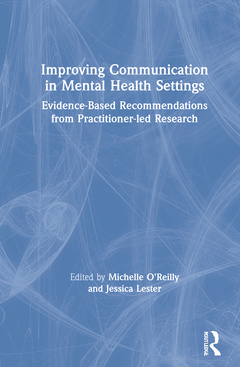Improving Communication in Mental Health Settings Evidence-Based Recommendations from Practitioner-led Research
Coordonnateurs : O'Reilly Michelle, Lester Jessica

Improving Communication in Mental Health Settings draws on empirical studies of real-world settings to demonstrate contemporary practice-based evidence, providing effective strategies for communicating with patients/clients in mental health settings.
The book integrates clinical experience and language-based evidence drawn from qualitative research. Drawing on studies that utilize scientific language-based approaches such as discourse and conversation analysis, it focuses on social interaction between professionals and patients/clients to demonstrate effective communication practices. Chapters are led by clinical professionals and feature a range of mental health settings, different mental health conditions and types of patient/client, and evidence-based recommendations.
This book is an essential guide for professionals working in mental health and/or social work, and those training or working in clinical areas of mental health practice.
1. Introduction: Communication, mental health, and how language-based research can help in practice Part 1: Communication with children and families 2. Communication in child mental health: Improving engagement with families 3. Exploring the practical potential of discursive research in family therapy 4. Communication in clinical psychology – using ‘you said’ in interactions with children to assess for risk 5. Children’s communication and their mental health: perspectives from speech and language therapy 6. ‘Just ask’: How to talk to children and young people about self-harm and suicide risk 7. Communicating with parents about psychotropic medication treatment Part 2: Communication with adults 8. Deception, fantasy and confabulation: What the stories of forensic patients with intellectual disabilities tell us about truth in therapeutic interactions 9. Communicating about feelings: examples from depression care 10. Communication in mental health nursing – the power of the words we choose 11. Exploring the ‘talk’ of suicide: using discourse-informed approaches in exploring suicide risk Part 3: Learning Journeys 12. A PhD learning journey - the value of conversation analysis and discourse approaches for speech and language clinical practice. 13. Developing supra-vision using naturally occurring video material within supervision 14. Communication in research, evaluation or audit
Michelle O’Reilly is an associate professor of communication in mental health at the University of Leicester, UK.
Jessica Nina Lester is an associate professor of inquiry methodology in the School of Education at Indiana University, Bloomington, USA.
Date de parution : 03-2021
15.6x23.4 cm
Disponible chez l'éditeur (délai d'approvisionnement : 14 jours).
Prix indicatif 178,41 €
Ajouter au panierDate de parution : 03-2021
15.6x23.4 cm
Disponible chez l'éditeur (délai d'approvisionnement : 14 jours).
Prix indicatif 40,18 €
Ajouter au panierThème d’Improving Communication in Mental Health Settings :
Mots-clés :
Selective Mutism; Clinical professionals; Attention Deficit Hyperactivity Disorder; Communication practices; Clinical Practice; Social work; Mental Health; Mental health settings; CAMHS; Evidence-based recommendations; Clinical Audiences; PF; Hypothetical Future Scenarios; Child Mental Health; Mental Health Assessments; Adolescent Mental Health Services; Key Words; ADHD Care; Medium Secure Psychiatric Hospital; Child Mental Health Research; Hospital Ward Rounds; Physical Words; Child Centred Research Methods; Feeling Words; Atypical Interaction; CAMHS Setting; Conversational Device; Factitious Disorder; Central Sensitivity Syndromes; Detailed Data Extracts



